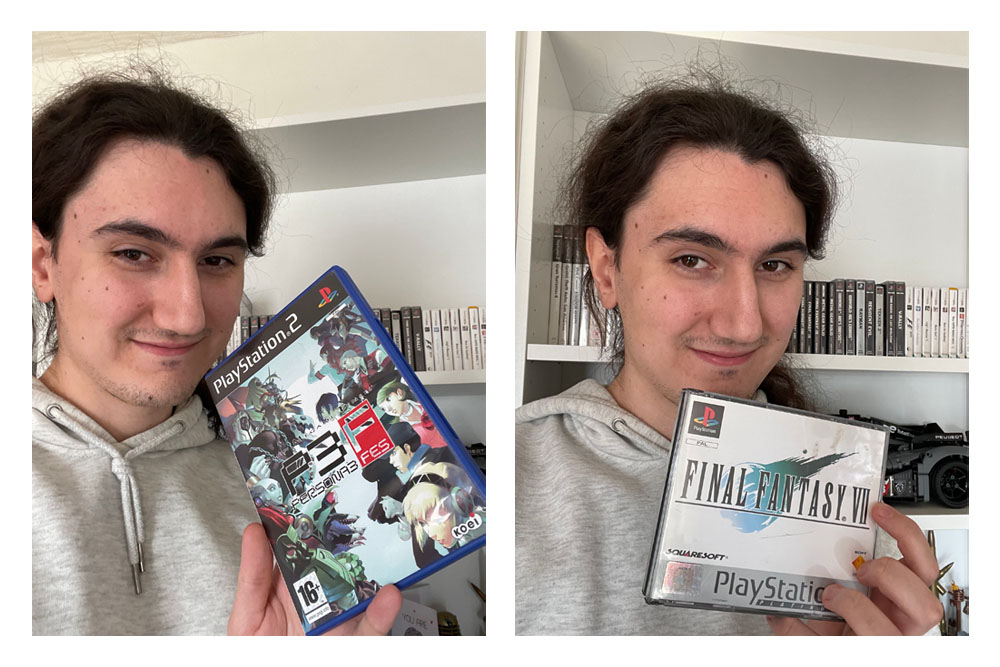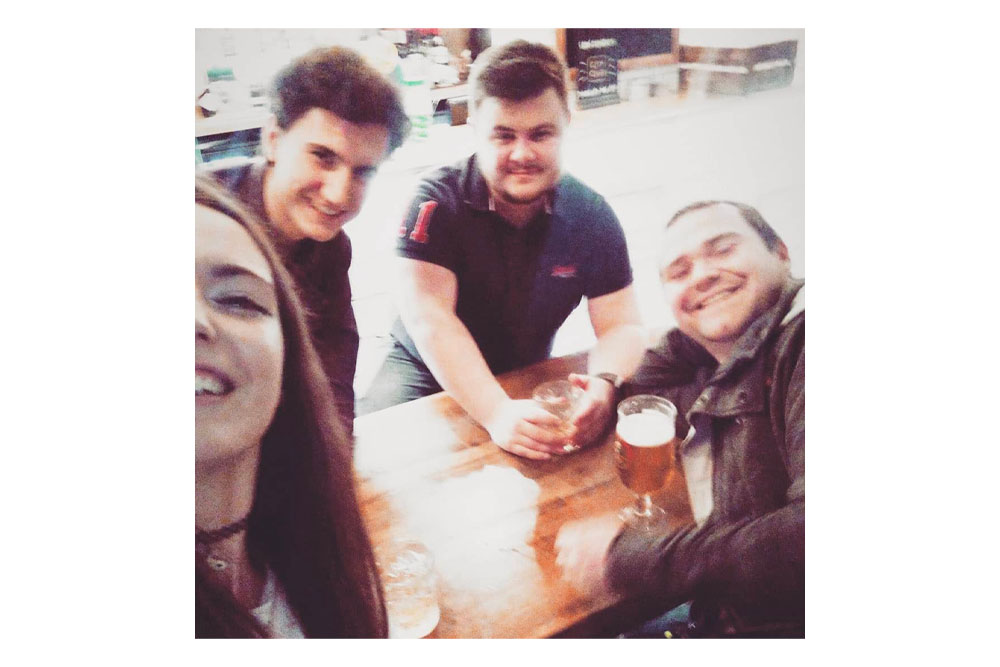After joining Expression Games in May 2023, we caught up with Sound for Games & Apps graduate - now our BA (Hons) Sound Design degree - Tom Smart to talk about landing his first industry role, audio design for a live service game and transitioning from student to professional.
The UK gaming industry is an incredibly exciting sector to work in. Not only worth £7.05 billion in 2022 and boasting 4,200 businesses, the pandemic saw a huge shift towards a more flexible working environment, making it much easier for people to maintain a healthy work-life balance.
The latest graduate to join this vibrant industry is Tom Smart, who has spent the last seven months working exclusively on World War Two online multiplayer, ‘Hell Let Loose’. Now firmly settled in his first industry role, we joined him to find out the full story.
Hey Tom! Before we talk about your work at Expression Games, tell us a little about yourself and where your passion for game sound began?
“For as long as I can remember, I've always played video games. My formative days were spent on the PS1 and PS2 playing games like Gran Turismo, listening to that insane and jazzy soundtrack, or Oddworld which has some really cool industrial music.
“At the same time, I was in primary school learning piano and violin and soaking up all kinds of classical music. In secondary school I was 100% about being a performer, but was introduced to production, which I felt was a good skill to have in my back pocket. While studying music production at Stratford College, we had a visit from someone who had worked on the audio team for the Forza Horizon games. During that session I was introduced to Wwise and I got a taste for the sound design side of things, too. That was really the catalyst for pursuing game sound at dBs.”

Tom with two formative video games from his childhood
(Persona 3 FES and Final Fantasy VII)
What was your experience like at dBs?
“Studying the Sound for Games & Apps degree was just pure gold dust, it's amazing knowledge, and having Jasz [Pike] to teach us was fantastic. He is so knowledgeable about everything and he was great to chat with and would always make time for us.”
How do you think dBs prepared you for working in the industry?
“Everything that I studied at dBs - except for procedural audio and Pure Data, because that's a whole other can of worms - I've used in some way since graduating. That’s compositional and FMOD skills for my portfolio, techniques on how to present myself professionally, talking about Wwise with my boss, audio design skills that I use every single day in my job. That experience has been invaluable.
“In particular the modules we did on spatialisation and middleware were done really, really well. There was a lot to learn, but Jazzy was so good at explaining it all, he did so many tutorials, always had time for 1-to-1, and it was why I fell in love with Wwise.
“I want to shout out Matt [Owen] as well. He has been an incredible buddy to have, to discuss things with, and then eventually showing each other stuff that we've been working on as well. As soon as the Virtex beta was opened up, I was straight in there to see what he'd been working on.”

A group photo of Tom with his classmates Emma Stray (pictured left),
Matt Owen (pictured right) and tutor, Jasz Pike (pictured far right)
You’re now a Junior Audio Designer at Expression Games. Can you tell me a bit about the company and what your role entails there?
“I’m one of two people in the audio team. Expression as a whole is around 70 employees and we’re a completely remote studio. Right now, our sole focus is working under Team17 on ‘Hell Let Loose’. My role, specifically, as an audio designer is making sounds and chucking it into Unreal, and fixing the many, many bugs you get with a live service game.”
How does the experience of working on a live service game like ‘Hell Let Loose’ differ, specifically as an audio designer?
“It's a lot more complicated, especially if you weren't there from the start, so you're essentially picking up the pieces from everyone else. It's great for learning stuff on the fly and getting into the rhythm of things. Live service games are a very different beast to developing something from scratch. It's all about being concise with your themes, maintaining a consistent vibe, while also improving upon it. ‘Hell Let Loose’ prides itself on realism. It's a hardcore shooter and we like to keep everything very authentic.
“What’s great at Expression is there’s no segregated spaces, everyone can drop in on other teams, so rather than me and my boss receiving the finished assets and levels and then creating audio, I can go in and see the level in its most basic state and start thinking about how we’re going to populate it with sound.”
How do you achieve that level of immersion and authenticity when you’re creating sound for real locations and weapons?
“It’s a mixture of bespoke sound design and utilising existing samples. We use AudioKinetic Strata, as they have a lot of gun sounds from the era as well as environmental audio. For example, we have night maps and with Strata, we can use their Western Wildlife libraries which means we don’t have to stand in a field recording owls for hours at a time or digging around multiple websites for good samples.
![Hell Let Loose screenshot 1 [Photo credit - Team17]](https://insider.dbsinstitute.ac.uk/hs-fs/hubfs/Hell%20Let%20Loose%20screenshot%201%20%5BPhoto%20credit%20-%20Team17%5D.jpg?width=1000&height=563&name=Hell%20Let%20Loose%20screenshot%201%20%5BPhoto%20credit%20-%20Team17%5D.jpg)
“It’s important to us that we don’t just take the gun sounds from Strata and drop them straight into the game. We want to manipulate it in our way with audio we’ve recorded, or samples that we’ve found online. Our goal is to be as good as, if not better, than Dice’s sound department which is a big ask for a team of two, but you know, shoot for the stars, aim for the moon. ‘Hell Let Loose’ already gets a lot of compliments for its sound design online, so we’re doing something right.”
What have been some of the personal highlights since joining Expression?
“One the first things I worked on was creating every single audio asset from the ground up in Practice Mode - previously called the War Room. I was under NDA for a while and couldn’t talk to my parents about what I was working on, and when they finally got them to try it out I don’t think they really understood what I had created, but I was still really proud of what I achieved.”
What has it been like to work as part of a professional game studio?
“It’s been great. Expression is a no crunch, people-first studio. We’re all able to work to our own schedules, which is amazing particularly when you’re beating your head against a task and just need to step away from your desk for an hour or two. Everyone has been so welcoming and your opinion is always valued.”
What has been the biggest lesson you have learned since graduating and progressing into the industry?
“I think one of the biggest lessons I learned is that you can’t just walk into a composer role in the game industry. My focus throughout university was composition, but I was always building a strong foundation in sound design and audio programming which is a big reason why I got the job at Expression.
“Moving from education, where you're constantly learning, and you're constantly being fed back upon and learning new skills and meeting new incredible people; you go into work where you are constantly learning, being fed back and meeting new incredible people. So in some ways it's different, in some ways, it's no different at all.”
Any final thoughts or words of wisdom you’d like to share?
“A lot of people are scared to go to uni because it's three years of not having a job. Obviously, you can still do volunteer or part-time work alongside it. But uni is 100% worth it to start learning the ropes and be taught by experts. Once you've done that, you can jump straight into a job role and get the ball rolling, even if you're a junior.
“While experience matters, I feel it's more about being able to show the product you can create in your portfolio. If your showreel can demonstrate that you have the skills of someone who has three years of experience - which is always what studios seem to ask for and it’s always at a AAA studio - then I personally think that experience doesn’t matter as much, which is important for graduates because how many are able to get experience on a AAA title alongside their degree?
“Obviously, you can build those skills without going to uni, but if you do go, you’re going to learn so much more, and it doesn’t compare to online tutorials. As much as I love the Wwise 101 tutorial, it’s not the same as Jasz teaching me how it’s done.”
FIND OUT MORE
Jamie Gibney: Solo developing an accessible audio plugin
Video Masterclass | Bjørn Jacobsen on life as a sound designer for video games
Video | How to get into the games industry with FORMAT Founder & CEO
Aspire to follow in Tom's footsteps and create immersive audio for video games? Our BA (Hons) Sound Design degree is perfect platform to launch your career.


